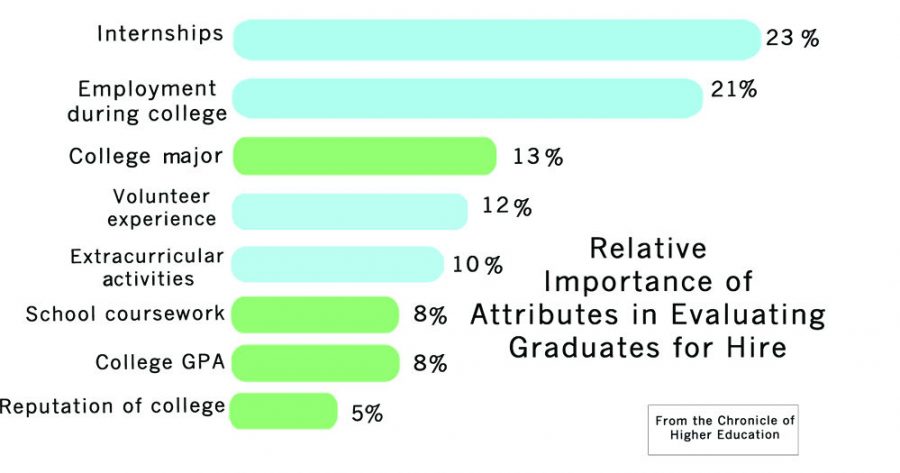Shred the transcript: Employers value experience, not GPA
September 11, 2014
Next time you find yourself choosing career work over class work, don’t fret. Evidence shows your transcript won’t be a one-way ticket to a dream job.
A 2012 survey by the Chronicle of Higher Education and American Public Media’s Marketplace discussed what attributes employers value most when hiring college graduates. What employers had to say to employees: to them, nearly everything is more important than GPA.
The surveyors invited 5,000 employers to participate in the study. Sixty-seven percent of employers participants were in management, executive or senior executive positions, while the other 33 percent were labeled “experienced.”
Students may think that grades are the most important part of getting hired, but employers seem to overlook GPA, according to the results of the study. Internships topped the list of “Relative Importance Of Attributes in Evaluating Graduates for Hire,” while GPA landed toward the bottom of the list of at number seven out of eight. Also listed in order of most to least importance was employment during college, college major, volunteer experience, extracurricular activities, relevance of coursework and last, college reputation.
“Unpaid internships and volunteer work have a big impact on employers hiring decisions,” the survey said.
After graduating from Duquesne University with a master’s degree in English, Whitney Robinson said she found out “college GPA is useless in the real world.”
“What matters is that you did well in your area — that teachers can speak well of your work ethic and attitude, not if you had a 4.0,” Robinson said. “My knowledge from college classes is great and incredibly useful, but, at the end of the day, a hard worker with adaptability and intelligence is more valuable,”
Robinson works for a financial investment company and said having skills that don’t come from books were what was most helpful to her when looking for a job.
“Certainly you can program or do taxes, but, if you can’t coordinate a schedule between your co-workers or think on your feet, then book learning isn’t worth much,” Robinson said.
Pitt’s Office of Career Development and Placement Assistance regularly seeks feedback from recruiters regarding what attributes and skill sets employers value in graduates, according to Career Development director Cheryl Finlay.
“There are a number of qualities that all graduates, regardless of degree earned, should leave college with,” Finlay said. “Examples include strong communication skills, a sense of self, motivation and a sense of responsibility.”
Finlay named attributes that couldn’t be part of college course, such as the ability to adapt to changing technology.
“They also need to be reflective individuals who have clear personal and professional goals,” Finlay said. “They need to be motivated to take on the challenges and demands of the workplace and, most importantly, they need to have a sense of responsibility toward their community and society.”
Though these traits may come naturally throughout college years, Finlay said that internships are vital, just as the survey shows.
Finlay explained how Pitt helps students to make sure they have an internship experience during their college years with the University Internship Guarantee, which is internship placement for students who complete an internship prep program at Pitt.
What do employers have to say about all this?
Lisa Crouse, the Campus Recruiting Manager at KPMG, a global accounting firm with an office in Pittsburgh, said the firm hires a large number of recent college graduates annually.
“College is typically where we find a lot of our positions. We hire college students from across the country and, specifically the University of Pittsburgh,” Crouse said.
Crouse particularly values employment in general during college, which was second from the top in the survey.
“Having a part time job in a sales role, although you wouldn’t say that directly relates to working at KPMG, makes the employee develop attributes that come from that experience such as customer service skills and dealing with the public,” Crouse said.
KPMG will be at the Career Conference in the David L. Lawrence Convention Center on September 19. KPMG also has come in to Pitt to do resumé reviews for students.
A lower GPA could possibly be more acceptable, Crouse said, if it resulted from active involvement in college activities that showcase a student’s abilities.
“There has to be a balance. If your grades are very low yet you have no other involvement, there is no excuse,” said Crouse.
Though KPMG seemed to be less strict about GPA, in comparison to outside of the classroom strengths, PricewaterhouseCoopers (PwC), another accounting firm, ranks it higher on their personal list.
Alexa Merschel, the U.S. Recruiting Leader for PwC, said while they definitely take into consideration other extracurricular activities, the firm still heavily considers GPA.
“Success at the firm is directly correlated with GPA. Higher GPA, in most cases, equates to work ethic and dedication to academic excellence,” Merschel said.
Although GPA is extremely important at PwC, Merschel said they still pay attention to other factors that could balance out an application with a lower GPA. Merschel said the official GPA minimum is a 3.3, but PwC will accept above a 3.0 if a student is involved in other campus and career activities.
“However, there are other factors that go into the hiring process, such as extracurricular activities you are involved in and how you have demonstrated leadership skills through various organizations you are involved in,” Merschel said.
According to Crouse, colleges must keep in touch with business professionals to understand what they truly want in terms of preparation of students for their careers.
“Just like any career, it is forever changing,” Crouse said.



